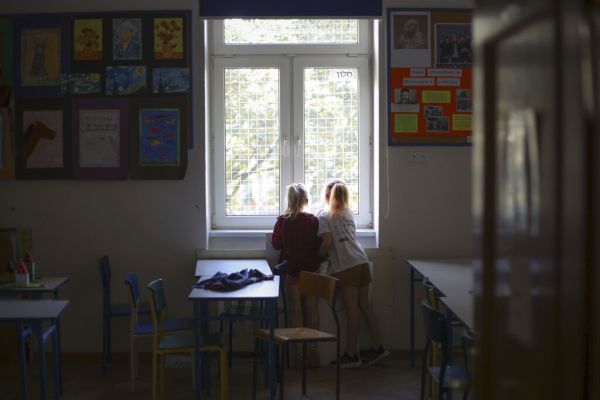Jewish-run summer camp for refugees gives joy to youngsters while preparing them for new school year in Poland.
By Associated Press
A 5-year-old girl’s drawing at a summer camp in Poland’s capital caught the eye of one of her counselors. Why did she use black and white, and not red or pink, to make a heart, Rabbi Ilana Baird asked the child.
The girl, sighing heavily, said it was black like the dog she left behind in Ukraine.
Baird, who lives in California, volunteered with several other Jews originally from Russia or other parts of the former Soviet Union to mentor Ukrainian refugee children at the camp in Warsaw. The program, which ended Friday, was designed to give some joy to youngsters traumatized by war, to help prepare them for a new school year in Poland, and to give their mothers some time to themselves.
After performing puppet shows and reading stories to her group of 5- and 6-year-old campers, painting a lot of little faces and dispensing lots of big hugs, the rabbi saw another heart drawing. This one was pink.
“Happiness,” the girl explained.
Baird, 48, was happy to see cheerful colors and rainbows also emerging in the artwork of other children under her care at the Kef Be Kayitz camp, a Hebrew name that means Fun in the Summer.
For the volunteers, the decision to take time off from their usual jobs in the United States and fly to Poland to work with the Ukrainian children was driven by a desire to help those in need, a value that is universal and a central part of Jewish religious teachings.
“Jewish people have suffered so much in the past. We suffered pogroms, we suffered the Holocaust and we suffered antisemitism,” Baird said. “And we have a sense of obligation to help people who are suffering right now.”
After Russia invaded Ukraine on Feb. 24, people across Poland sprang into action to welcome and help refugees from the neighboring country. Poland has accepted more of the war’s refugees than any other nation.
Local and international Jewish organizations also wasted no time in trying to meet the most urgent needs: to house and feed the Ukrainians, most of whom are women and children.
With the war about to enter its sixth month, the camp at the Lauder Morasha School in Warsaw reflects the type of programming being developed to meet the changing needs of refugees. Many Ukrainians realize they won’t be able to go home soon, or perhaps ever, said Helise Lieberman, the director of the Taube Center for Jewish Life and Learning.
Mornings were devoted to Polish, English and math lessons so the children will be in a stronger position to adapt to school. Many of the Ukrainian kids who arrived in Poland since February finished the Ukrainian academic year remotely but will be entering Polish schools in September.
Campers spent afternoons doing arts and crafts, playing sports and making excursions to city museums and parks. About a third of the 90 children who attended the camp are Jewish, according to Marta Saracyn, the head of the Jewish Community Center of Warsaw.
“It’s a lovely bubble for kids to be kids,” Saracyn said.
Some of the Ukrainian refugee mothers need to look for jobs, and some are severely depressed after being separated from partners and relatives back home, organizers said.
The Taube Center and the Jewish Community Center of Warsaw organized the camp in conjunction with the Jewish Federations of North America, the Jewish Agency for Israel and the American Joint Distribution Committee.
The Jewish Federations of North America recruited nearly 90 Russian-speaking educators and rabbinic leaders to help Ukrainian refugees in Poland and Hungary, and 10 helped out at the Warsaw camp, said Hannah Miller, who runs the volunteer program.
The 10 camp volunteers are Russian-speaking immigrants who left the Soviet Union decades ago, or the children of Russian Jewish immigrants. Only a couple spoke Ukrainian, so they mostly spoke to the children in Russian, which is also widely used in much of Ukraine.
Baird recalled painting the face of a boy who became upset when he realized she wasn’t from Ukraine. “Why did you come here?” he asked her.
“Because you don’t need to be from Ukraine to help others,” the rabbi answered, “you just need to be human.”
The Jewish school where the camp took place is located blocks from the former Warsaw Ghetto, where Jews were imprisoned by German forces, killed and starved during the Holocaust before they were sent to concentration and extermination camps.
Poland was home to nearly 3.5 million Jews before World War II, most of whom were killed by German Nazi forces. But Jewish life has reemerged in the country since the fall of Moscow-backed communism in 1989.
“If this had happened 30 years ago, there would not have been Jewish communal institutions to provide relief and care,” said Lieberman, an American who was the founding principal of the Lauder Morasha School.





